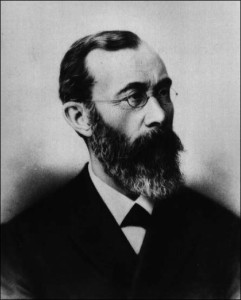
| Born: Aug 16, 1832 in Grand Duchy of Baden, German Confederation |
| Died: Aug 31, 1920 (at age 88) in Großbothen near Leipzig, Germany |
| Nationality: German |
| Fields: Experimental psychology |
| Famous For: Father of experimental psychology |
Wilhelm Wundt was a pioneering figure in German psychology and the first person to use the term “psychologist” about himself. He was also a philosopher, professor, and physician. Wundt made a distinction between psychology and the wider fields of philosophy and biology.
He was the founder of the Leipzig University laboratory, the first of its type in the world. Wundt was also the creator of the world’s first psychology-based research journal, which he set up in 1881.
Early Years
Wundt was born near Mannheim in August of 1832, the son of a minister. When he was six years old, the family moved to Baden. The young Wilhelm received his education largely from the assistant to his father, and the two later shared a house.
Wilhelm then underwent more formal schooling in Bruchsal and Heidelberg before being accepted to the University of Tübingen. Here, he studied medicine and was known for his devotion to his work. He published his first paper on medicine while still an undergraduate. However, he felt that his talents lay more in physiology than general medicine, and he studied this in Berlin for a while before receiving his doctorate in medicine at the age of 24.
Teaching Career
In 1858, the renowned Hermann von Helmholtz came to Heidelberg, and Wundt worked alongside him for some years. He impressed the older man so much that when Helmholtz departed for Berlin, it was thought Wundt would replace him. Instead, another man was chosen and Wundt took up a role as professor of philosophy at the University of Zurich, before moving on to Leipzig.
It was here that his talents could truly be indulged, and the university soon granted his small psychology room formal laboratory status. His lectures were extremely popular with hundreds enrolling in his courses and remained so for many years. By 1912, at the height of his fame, he was teaching over 600 students.
Later Career and Publications
Even before his move to Leipzig, Wundt’s work had become sufficiently well-regarded for it to be published: Lectures on the Mind of Humans and Animals appeared in 1863. However, his most important work was to appear in 1874.
Principles of Physiological Psychology was a truly ground-breaking publication and the first specialized psychology textbook ever to be written. Wundt stated his opinion that it established psychology as “a new domain of science” and the book brought together a number of Wundt’s ideas about consciousness. These included how emotions, ideas, and feelings could be linked by the “internal perception” method, a name Wundt gave to the idea of examining one’s own consciousness.
Wundt’s strong work ethic, which had begun in childhood, continued throughout his life, and he was a prolific writer, publishing dozens of books and papers on psychology into his old age. His later work concentrated heavily on social psychology, and for a while his was considered the leading voice in the field.
However, later in the 20th century, men led by B. F. Skinner rejected many of Wundt’s ideas, including regarding the mind’s internal structures. From this point onward, Wundt’s work became less influential other than in terms of his historical significance to psychology as a whole.
Wundt died on August 31, 1920, two weeks after his 82nd birthday.